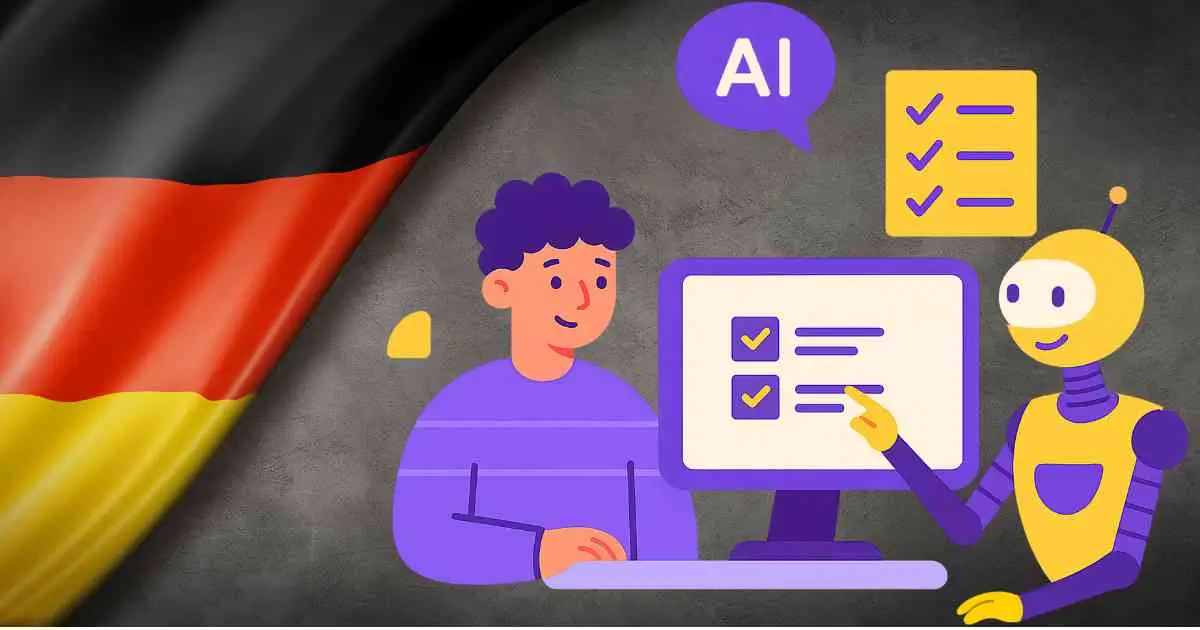


Germany currently has over 630,000 open job positions. Since this number can hardly be filled by locals, the German job market continues to represent a strong opportunity — especially for international candidates. Demand is particularly high in sectors such as healthcare, elderly care, labor-intensive industries, IT, and public services. Even though economic growth in Germany […]
Germany currently has over 630,000 open job positions. Since this number can hardly be filled by locals, the German job market continues to represent a strong opportunity — especially for international candidates. Demand is particularly high in sectors such as healthcare, elderly care, labor-intensive industries, IT, and public services. Even though economic growth in Germany is currently slow, job prospects remain solid for applicants from abroad.
As worldwide, artificial intelligence is accelerating change in both the German and European job markets. Many routine tasks — including clerical work and basic programming — are increasingly being automated. “Currently, Europe is behind the large-scale job market restructuring already visible in the United States,” says Wolfgang Sender, founder of Life-in-Germany.de, a website focusing on work migration and training opportunities. “Massive changes will come to Europe as well. But for now, we expect that the demand for international applicants will remain high despite AI-driven shifts in the job market.” Considering the aging populations in all major European countries, Sender expects that opportunities for internationals will persist — both in highly qualified positions and in roles that cannot easily be replaced by machines, such as human-focused services, technical trades, and knowledge-based AI development.
For career starters, two main entry paths stand out in Germany: hands-on dual vocational training (Ausbildung) and the new Chancenkarte (Opportunity Card) program.
The Ausbildung system is accessible to internationals across a wide range of traditional trades. This vocational training is highly structured in Germany and comes with a monthly salary during the training period, which is usually enough to cover basic living costs. After completing the two- to three-year program, graduates can stay and work in Germany. Sender expects continued demand in sectors where automation has limits and AI will have less impact: manual parts of logistics, healthcare, and social services.
Ausbildung is open to people from all over the world, with only two main requirements: completion of at least basic school education (around nine years) and German language skills at level B1, as all training is conducted in German. It is especially suitable for candidates who have just finished school or university and want to start a career in Germany with a structured, practical pathway that also leads to long-term residency options. Attractive positions cover sales, car mechanic, and IT trainings.
The Chancenkarte is a points-based immigration pathway designed to attract skilled workers from outside the European Union. Points are awarded for criteria such as educational qualifications, professional experience, language skills, age, and ties to Germany. Applicants who meet the minimum points threshold can enter Germany for up to one year to search for a job or an Ausbildung placement. During this period, limited part-time work is permitted.
The Chancenkarte is aimed more at university graduates and experienced professionals who already have qualifications and want to access the German labor market without a pre-arranged contract, using their skills and experience to secure a role quickly. Sender believes that the Chancenkarte is still underused and not well known internationally. He expects that AI will also change the job market for this target group in the coming years, but for now there are still many opportunities for foreign applicants, especially those who position themselves strategically in high-demand sectors.
Whether you apply for Ausbildung, Chancenkarte, or other existing options such as the EU Blue Card, FSJ, or BFD, Germany’s labor market expects clear documentation of your educational and professional background. “International applicants must understand that the German job market and education system are highly regulated,” says Sender, who advises hundreds of candidates each year. “Employers in Germany often distrust qualifications they don’t understand, and they may not be familiar with foreign education systems. Many applications fail because candidates don’t clearly show where, when, and at what level they completed their schooling or higher education.”
In addition, German employers want a precise understanding of a candidate’s skills. To address this, Sender only recently launched TopTest.ai, a platform that helps international applicants prove their abilities. Covering over 1,000 tests — from nursing and coding algorithms to logistics and the latest AI tools — candidates can take short online exams and receive a German-issued certificate that can be attached to job applications in Germany or abroad.
Sender acknowledges that these certificates are not equivalent to formal degrees. However, they serve two important purposes: firstly, to provide employers with tangible proof of an applicant’s skills; and secondly, to allow candidates to choose highly specific certifications tailored to the requirements of particular positions. “Employers will see both the skill and the German certificate — and that can make a real difference in application processes,” Sender explains.
